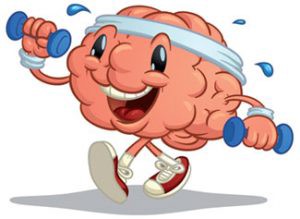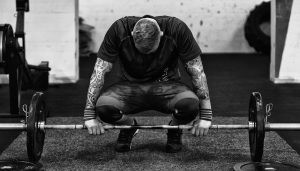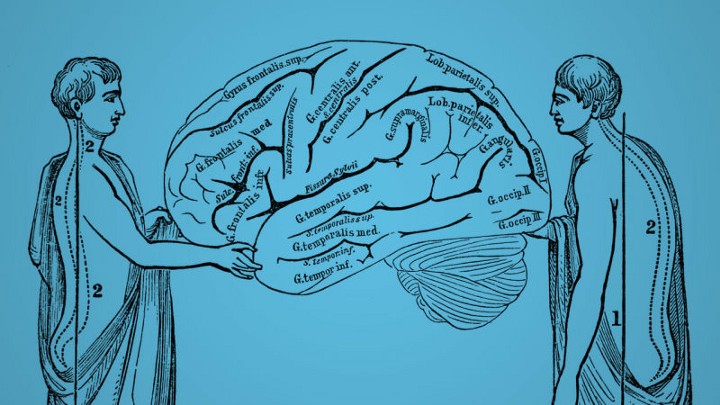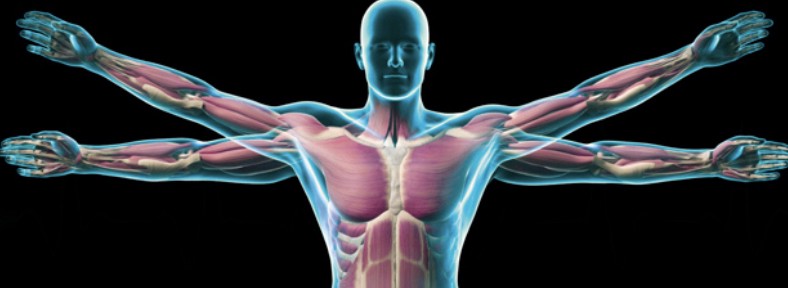Crosswords vs. CrossFit
You all know that I love nerding out when it comes to fitness. It usually starts with a seed of curiosity. It sits there in the back of my mind, as I start devising my own theories. Then, I spend hours doing research to see if any real science nerds have had the same curiosities as I did. Most of the time, I learn of things that I had completely overlooked but were right in front of me the whole time!
So, this is what happened when started wondering why there were some days when I left the gym after a rough workout, not only physically taxed but mentally exhausted as well. Heck, I’ve even missed my train stop after a good workout because my brain was so wiped out.

As I said, I had my own ideas about why this happens. But, after doing a great deal of research, I learned some interesting and really cool information about the brain, how it works, and WHY you’re mentally blasted after some workouts.
Your Brain
Your brain is a muscle. And like your body, it doesn’t want to work too hard. It prefers to just chill out. Like your other muscles, it takes energy to REALLY use your brain. Energy burns calories. Your body is wired to conserve energy as much as possible because remember, our brain and body is still in hunter and gatherer mode.

A good book on the topic of brain function is Danial Kahneman’s “Thinking Fast and Slow.” One of the main takeaways from this book is this: our brain is comprised of two systems; Kahneman calls them simply System 1 and System 2.
- System 1 operates automatically, intuitively, involuntarily and, most importantly, without effort. Think of driving to work for the thousandth time, or recalling what school you went to, or reading a facial expression.
- System 2 involves slowing down and thinking, reasoning, computing, or deliberating. Examples of these are: solving a math problem, filling out a complicated form, or performing a very strenuous and/or technical exercise.
How hard does your brain work throughout the day? Well it’s a demanding little rascal. Though it is only about 1.4kg, about 2% of your bodyweight, it demands 20% of our Resting Metabolic Rate (RMR), or the total amount of energy consumed by the body when you’re just sitting there doing nothing.
How do we measure “working harder”?
Like other muscles in your body, glucose is a source of energy for your brain. It gets this energy through blood flow. The glucose is then turned into ATP (Adenosine Triphosphate). ATP is the main source of chemical energy within cells.

So here’s what happens to your brain when you start doing a little more than vegging out in front of the TV. You have a thought — not just a “Wow, that’s a cute puppy” kind of thought, but a “If 6-inch water lilies double every day on a pond that is 20 feet by 20 feet, how many days until the pond is covered?” (I have no clue by the way) kind of thought. When you’re confronted with a thought like this, local capillaries dilate to deliver more blood than usual, as well as more glucose and oxygen. As you sit there, puzzling over a problem as complicated as this, blood, oxygen and glucose are being lapped up by your brain!
- One cool experiment showed that rats doing complicated maze-work had a 30 percent fall in glucose in their hippocampus (the part of their brain responsible for storing and coordinating memories).
- In another study at Northumbria University, volunteers that had to complete a series of verbal and numerical tasks showed a larger drop in blood glucose than people who were just asked to repeatedly press a key.
So, you’re probably thinking…Jayson, that’s all very interesting. But how does all of this relate to fitness training?
Think about System 1 and System 2 again. Does your brain have to work harder to sprint or do a heavy deadlift? If you said heavy deadlift, you’re right! To your brain, sprinting doesn’t take much work. It’s pretty much like driving to work or eating a bowl of cereal. It’s something you do often and without consideration — put one put in front of the other, repeat over and over again, quickly. On the other hand, deadlifting a heavy barbell requires A LOT of brain work. In order to pick that bar up properly, you need focus, balance, and memory for correct technique. Your brain is working in overdrive to protect you! Generally, the more muscles you use for a movement, the more neurologically taxing it is. The deadlift is known for using more muscles than any other exercise, even the squat. So, the next time you’re deadlifting twice your body weight, think about what a great workout you’re giving your brain in addition to all those muscles from the neck down!
That’s just one example. Now let’s look at some of the other ways training affects the neurological system.
- Adrenaline — Nerves are a huge part of your neurological system. Getting psyched up for a big competition or event takes a big toll on your brain. You’re focused on envisioning what you’re about to do. You’re thinking about crushing it. You’re picturing yourself suffering through the movements. Before a competition, you’re sure to have a thousand thoughts racing through your brain. THIS explains why I couldn’t string two sentences together for the rest of the day, after I completed the Gym Jones Triathlon. (It’s a horrible mix of a 500m Ski Erg, 50 Cal. Airdyne Bike, and 500m Row all to be done in less than 5 minutes)
- Max Reps — Think of lifting something so heavy that you can only do it 1 to 5 times max. When you’re lifting a lot of weight, it takes total attention. (That was me deadlifting 475 lbs.) Your brain is coordinating a lot of muscles to do the job at hand.
- Difficult or new movements — When you’re performing a movement that is particularly hard, or that you’ve just learned, your brain is working hard to figure out what muscles it needs to do the trick, and then coordinating them in a way that will result in proper performance. I see it all the time when I teach a new combination in my boxing class. After the class, my athletes will more often say they’re mentally wiped from doing these new movements. The same goes for Olympic lifts. Doing a snatch or a clean and jerk even when you’re an experienced lifter requires so much technical thinking, that each lift is as neurologically taxing as it is physically.
Crosswords vs. CrossFit?
Okay, so solving ridiculous math problems on the SATs and lifting a heavy barbell both can be physically and mentally draining. Here’s another quandary — why don’t people doing the NY Times Sunday crossword have to take a nap afterwards, but students consistenly report being mentally fried after completing the grueling SAT exams? The answer in one simple word — stress. The stress of the consequences related to taking this exam, the stress of HAVING to be there in order to get into a good school, the stress of your whole future hanging on the results of this one test. (Boy am I glad I’m not a high school senior right now).

The mental and emotional stress caused by the SAT exams can be replicated in the realm of sports and fitness too. For me, I experience this before one of my triathlons or a CrossFit Open workout. My stomach is rumbling with anticipation, my mind is racing, my heart is pounding, my nerves are on edge. And by the time I’m done competing, I’m mentally wiped! I think that’s why when I’m about to do a Gym Jones workout, I don’t even want to know what it is until right before I’m about to do it.
We had to do a 2000m row and ski erg in less than 7 minutes at our Level 2 seminar. Everyone knew it was coming. I started getting nervous three days beforehand! By the time I was done with my 6:52 of rowing, I couldn’t think straight. And it took me hours to gather my thoughts — well after I had caught my breath and the sweat had dried.

So, if you’ve ever wondered why your brain feels like mush after one of my intense sessions or classes, now you know why. And when you’re planning a workout, keep this in mind. Know that difficult movements should be done first, when your brain is ready to help you, not at the end of a workout when you may be a little fried. Try to limit the amount of mental and emotional stress you put on yourself before a competitive workout or a race. And finally, just embrace it. Be comfortable with being a total dummy after some workouts or races. It happens. And you’re probably better for it because it means you put your brain through a great workout in addition to your body. And when this happens, reward yourself with a little nap and get ready to crush it all over again tomorrow.






Responses